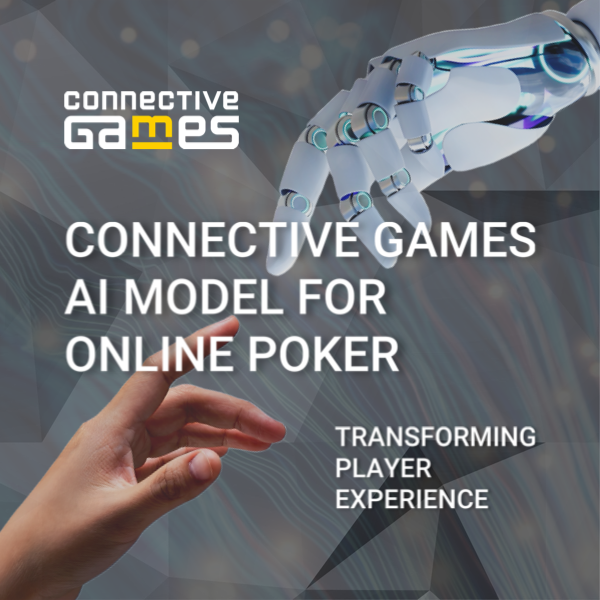

Connective Games AI Model for Online Poker: Transforming Player Experience
In the fast-paced world of online poker, player experience is the cornerstone of engagement and retention. As competition intensifies, operators are constantly exploring innovative technologies to offer more personalized services and build stronger communities.
Artificial Intelligence (AI) has emerged as one of the most promising tools to elevate how operators interact with players — not only by enhancing gameplay but also by streamlining support, engagement, and safety.
Connective Games is currently exploring this frontier with the Connective Games AI Model (CG AI Model) — an early-stage neural network designed specifically for online poker. Built with inspiration from advanced language models like ChatGPT and paired with a poker-focused module, this AI aims to become a smart, adaptive tool that integrates seamlessly with gaming processes.
While still in research and development, the CG AI Model reflects a broader commitment to innovation under our company’s new software development program. In this article, Francisco Gómez, CTO at Aconcagua Poker Networks and Connective Games Malta, shares insights into this technology’s potential and how poker operators might eventually integrate it into their ecosystems.
The Power of Connective Games AI Model
The CG AI Model is envisioned as an intelligent neural network capable of processing natural language and understanding the unique dynamics of online poker. While development is ongoing, the core ambition is to create a system that enhances user interaction in ways that are both helpful and enjoyable.
Poker Module: Enabling Smarter Interactions
What makes the CG AI Model stand out is its dedicated poker module — a component designed to reflect years of domain expertise. This module is expected to handle contextual poker-specific conversations and assist with game-related scenarios. Though in early development, it represents a step toward smarter, more responsive poker platforms.
Research and Development: Building Thoughtfully
The project is currently in the research and testing phase. Every iteration helps refine both the model’s performance and its ability to adapt to the evolving nature of player behavior. While no launch timeline is set, the goal is to build a technology that aligns with the needs of both operators and their communities over time.
Leveraging Connective Games AI Model
Even at this stage, the potential use cases for the CG AI Model are expansive. Once matured, the model could contribute to a range of key areas in online poker operations:
1. Personalized Player Assistance
The AI could act as a 24/7 virtual assistant, helping users navigate rules, troubleshoot issues, or improve gameplay understanding. For new players especially, this could reduce onboarding friction and improve overall satisfaction.
2. Player Engagement and Retention
Future iterations of the model may enable casual, friendly conversations — offering game tips, fun facts, or poker trivia to keep players engaged. Such interactive features can boost session length and foster a more dynamic table environment.
3. Enhancing Community Building
The AI could help moderate chats, support player-driven events like virtual tournaments, and encourage interactions that go beyond gameplay. This opens the door for deeper social experiences within poker rooms — a critical retention lever.
4. Responsible Gaming Support
By providing timely information about gaming limits or helping players self-assess, the model could serve as an unobtrusive layer of responsible gaming support. Operators might eventually integrate features that promote awareness and encourage healthy play.
5. Marketing and Promotions
With time, the CG AI Model could be trained to understand player preferences and assist in delivering personalized promotions or suggesting relevant tournaments. It might also help streamline marketing workflows like email personalization or basic social media engagement — without needing a large human team.
6. Anti-Fraud Measures
While not a standalone solution, the CG AI Model could support fraud detection in communication patterns — such as spotting repetitive language, phishing attempts, or unusual user behavior. However, any such capabilities would need to work in tandem with more robust fraud detection systems and human oversight.
Integration Path: A Glimpse Ahead
Although still in development, the eventual goal is to make the CG AI Model easy for operators to integrate into their platforms. Early concepts involve a modular setup with API access and optional onboarding support.
Poker operators interested in participating in future pilot programs or sharing early feedback will be instrumental in shaping the tool’s direction. For now, we are focusing on laying a strong technical foundation and encouraging dialogue with the industry.
Ethics and Transparency
As with any AI application in gaming, ethical use is critical. While the CG AI Model will not influence gameplay or outcomes, it is being developed with privacy and transparency in mind. Future iterations will comply with applicable regulations such as GDPR, and player data usage will be strictly limited and clearly communicated.
Building trust between players and platforms is as important as technical performance — and remains a priority throughout the development process.
Conclusion
The Connective Games AI Model represents an exciting early step toward reimagining how AI can enhance the online poker experience. Though still in the R&D phase, its potential to enrich player engagement, assist operators, and support responsible gaming is already clear.
Our long-term goal is to create a flexible, reliable AI system that empowers poker operators while keeping players at the center of the experience.
Interested in learning more or exploring future collaboration opportunities?
Reach out to us at [email protected] — we’d love to connect.
